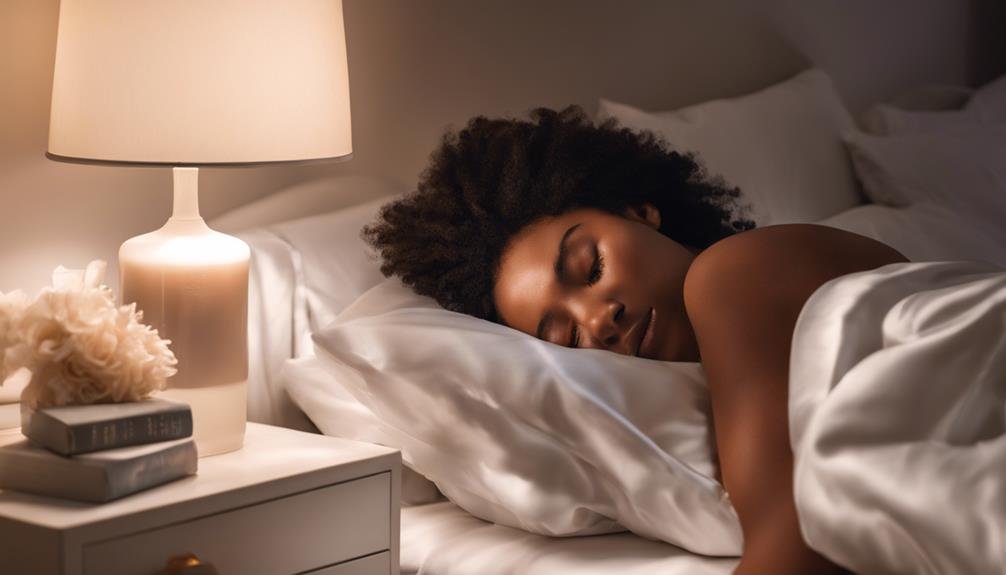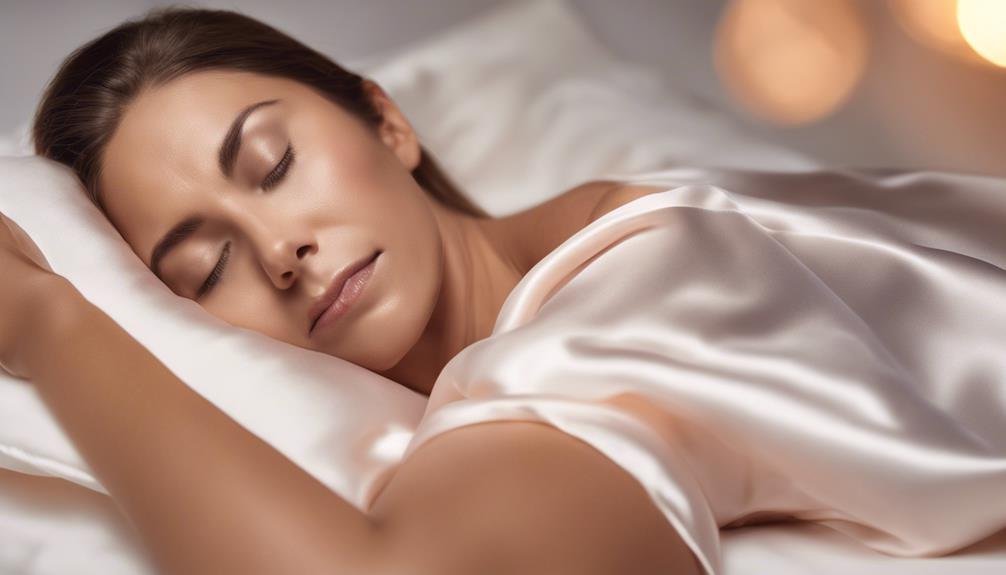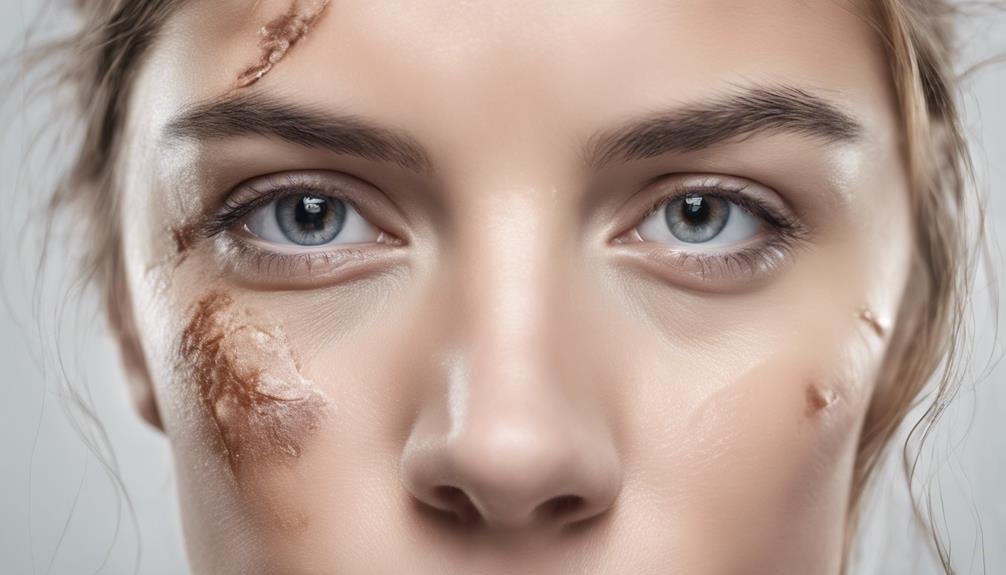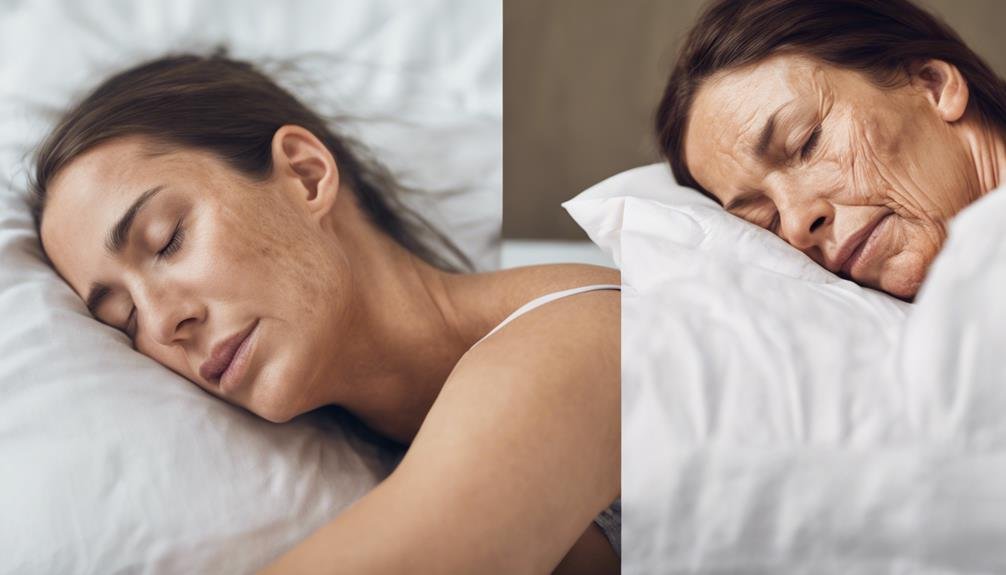"Cherishing Little Steps - A Haven for Baby and Family Journeys"
Beauty Sleep: How It Affects Your Skin
Ensuring you get adequate rest each night isn't just about feeling energized the next day. Have you ever considered how your skin might be impacted by those hours of slumber? The relationship between beauty sleep and skin health is a fascinating one, with sleep influencing everything from collagen production to moisture levels. You might be surprised by the profound effects quality sleep can have on your skin's appearance.
Key Takeaways
- Beauty sleep boosts collagen production for skin elasticity and reduces wrinkles.
- Adequate sleep supports skin's natural renewal process for a youthful complexion.
- Lack of sleep increases cortisol levels, leading to dull and dry skin.
- Quality sleep enhances skin's moisture retention and repair, promoting a radiant appearance.
- Improved blood circulation during sleep delivers essential nutrients for skin health.
Importance of Beauty Sleep

Getting enough beauty sleep is crucial for maintaining healthy and radiant skin. During sleep, your body goes into repair mode, producing collagen that helps in skin elasticity and reducing wrinkles. Lack of sleep can lead to increased cortisol levels, a stress hormone that breaks down collagen, resulting in dull and sagging skin.
Additionally, inadequate sleep can impair the skin's ability to retain moisture, leading to dryness and exacerbating conditions like eczema and psoriasis. While you sleep, blood flow to the skin increases, aiding in the delivery of essential nutrients and oxygen, promoting a healthy glow.
Deep sleep phases are also when the body repairs UV damage and fights off free radicals that contribute to premature aging. To ensure your skin reaps the benefits of beauty sleep, aim for 7-9 hours of quality rest each night, establishing a relaxing bedtime routine and creating a conducive sleep environment.
Prioritizing sleep is a simple yet effective way to support your skin's health and vitality.
Skin Renewal Process
Amidst the realm of skincare, the skin renewal process stands as a fundamental aspect that intricately intertwines with the concept of beauty sleep. While you slumber, your skin undergoes a natural regeneration process that is vital for maintaining a healthy and youthful complexion. Let's delve into the intricate workings of this skin renewal process:
| Process | Description |
|---|---|
| Cell Turnover | Old skin cells are shed, making way for new cells to rise to the surface, promoting a fresh appearance. |
| Collagen Production | Collagen, crucial for skin elasticity, is synthesized during this phase, aiding in a firm and plump skin. |
| Repair and Regeneration | Damage from UV rays and environmental stressors is repaired, ensuring skin remains resilient and healthy. |
Understanding the significance of the skin renewal process sheds light on why beauty sleep is not just a luxury but a necessity for vibrant skin. By prioritizing your sleep, you actively support your skin's natural rejuvenation, leading to a radiant complexion that reflects your inner well-being.
Collagen Boosting Benefits

Enhance your understanding of the intricate world of skincare by exploring the remarkable benefits of collagen boosting. Collagen is a protein that provides structure to your skin, keeping it firm and elastic. As you age, collagen production naturally decreases, leading to sagging skin and wrinkles. However, incorporating collagen-boosting practices into your skincare routine can help counteract these effects.
Collagen boosting can improve skin elasticity, reducing the appearance of fine lines and wrinkles. It also promotes skin hydration, making your skin look plumper and more youthful. Additionally, collagen helps to repair and renew skin cells, giving you a smoother complexion and a more even skin tone.
To boost collagen production, consider using skincare products that contain ingredients like Vitamin C, retinol, and peptides.
You can also support collagen synthesis by maintaining a healthy diet rich in antioxidants and staying hydrated. By incorporating collagen-boosting practices into your skincare regimen, you can achieve firmer, more radiant skin that defies the effects of time.
Impact on Wrinkle Formation
When it comes to understanding the factors influencing wrinkle formation, it's crucial to delve into the impact of collagen levels on the skin. Collagen, a protein that provides structure and elasticity to the skin, plays a vital role in preventing the development of wrinkles.
During deep sleep, your body enters a repair and regeneration mode, which includes the production of collagen. This process helps to maintain the skin's firmness and smoothness, reducing the likelihood of wrinkle formation.
Lack of adequate sleep can disrupt this collagen production cycle, leading to decreased skin elasticity and the formation of wrinkles. Additionally, poor sleep quality can contribute to increased stress levels, which further accelerates the aging process and promotes wrinkle formation.
Sleep Deprivation Effects

Inadequate sleep can have profound effects on skin health, particularly in relation to the development of wrinkles and other signs of aging. When you don't get enough sleep, your body produces more cortisol, a stress hormone that breaks down collagen, the protein responsible for keeping your skin smooth and elastic. This collagen degradation can lead to the formation of wrinkles and fine lines, making your skin appear older than it should.
Additionally, lack of sleep can impair the skin's ability to repair itself from damage caused by environmental factors like sun exposure and pollution. This compromised repair process can result in a dull complexion and uneven skin tone.
Moreover, insufficient sleep can disrupt your skin's natural moisture balance, leading to dryness and increased sensitivity. This can exacerbate skin conditions like eczema and acne, making them more difficult to manage. To maintain healthy and youthful-looking skin, prioritize getting the recommended 7-9 hours of quality sleep each night.
Skin Barrier Function
Maintaining a healthy skin barrier function is essential for overall skin health. Your skin barrier acts as the first line of defense against environmental stressors, preventing water loss and protecting against harmful pathogens. Made up of lipids, proteins, and corneocytes, this barrier plays a crucial role in maintaining skin hydration and integrity.
When your skin barrier is compromised, moisture can escape more easily, leading to dryness, irritation, and an increased risk of skin conditions such as eczema and dermatitis.
Factors like harsh weather, excessive cleansing, and age can weaken the skin barrier, making it less effective. To support your skin barrier function, opt for gentle cleansers, moisturizers rich in ceramides, and products with ingredients like niacinamide and hyaluronic acid.
Adequate hydration, a balanced diet, and quality sleep also contribute to a healthy skin barrier. By prioritizing the maintenance of your skin barrier function, you can promote overall skin health and achieve a radiant complexion.
Overnight Repair Mechanisms

During the night, your skin undergoes a natural rejuvenation process, known as overnight repair mechanisms. This crucial period is when your skin focuses on repairing and regenerating itself from the day's exposure to environmental stressors.
One key player in this process is collagen production, which peaks during the night. Collagen, a protein essential for skin elasticity and firmness, helps to reduce the appearance of fine lines and wrinkles. Additionally, your skin's blood flow increases during sleep, allowing for better delivery of oxygen and nutrients to the skin cells, aiding in their repair and renewal.
Moreover, overnight repair mechanisms involve the shedding of dead skin cells and the production of new ones, contributing to a smoother and more radiant complexion. The skin also works to repair any damage caused by UV radiation and pollution, enhancing its overall health and appearance.
Ensuring you get adequate restful sleep is vital for supporting these overnight repair mechanisms and maintaining optimal skin health.
Blood Circulation and Skin Health
As your skin's blood flow increases during sleep, it plays a significant role in maintaining skin health and appearance. The enhanced circulation delivers essential nutrients and oxygen to the skin cells, aiding in their repair and regeneration processes. This surge in blood flow also helps in the removal of toxins and waste products, promoting a clearer and more vibrant complexion.
Improved blood circulation during sleep contributes to a youthful appearance by supporting collagen production, which is crucial for skin elasticity and firmness. The increased delivery of nutrients to the skin's tissues assists in the restoration of damaged cells, reducing the signs of aging such as fine lines and wrinkles.
Furthermore, adequate blood flow ensures that your skin remains hydrated and nourished, enhancing its overall health and resilience. By prioritizing quality sleep, you're supporting optimal blood circulation, which in turn contributes to a radiant and rejuvenated complexion. So, make sure to prioritize your beauty sleep to reap the benefits of enhanced blood circulation for healthier, glowing skin.
Melatonin and Skin Protection

Melatonin, a hormone produced by the pineal gland, plays a crucial role in skin protection and repair. This powerful hormone acts as a potent antioxidant, helping to combat the harmful effects of free radicals on your skin. Free radicals are unstable molecules that can damage skin cells and accelerate the aging process. Melatonin helps neutralize these free radicals, reducing oxidative stress and supporting your skin's overall health.
Additionally, melatonin helps regulate the skin's circadian rhythm, influencing processes like cell turnover and collagen production.
During the night, when melatonin levels are naturally higher, your skin goes into repair mode, working to undo the damage caused by environmental stressors during the day. This repair process is vital for maintaining healthy, youthful-looking skin.
Ensuring you get quality sleep can help optimize melatonin production, supporting your skin's natural defense mechanisms and promoting repair processes. By prioritizing restful sleep, you can harness the skin-protecting benefits of melatonin for a radiant complexion.
Tips for Better Sleep
The role of melatonin in promoting skin health underscores the importance of quality sleep for your overall well-being. To improve your sleep quality and enhance your skin health, consider implementing the following tips:
- Maintain a consistent sleep schedule: Try to go to bed and wake up at the same time every day, even on weekends, to regulate your body's internal clock.
- Create a relaxing bedtime routine: Engage in calming activities before bed, such as reading a book, taking a warm bath, or practicing meditation, to signal to your body that it's time to wind down.
- Ensure a comfortable sleep environment: Keep your bedroom cool, dark, and quiet to promote uninterrupted sleep and consider investing in a comfortable mattress and pillows.
- Limit screen time before bed: The blue light emitted from electronic devices can interfere with melatonin production, so try to avoid screens at least an hour before bedtime.
Sleep Position and Skin Care

Proper sleep position plays a crucial role in maintaining skin health and preventing premature signs of aging. When you consistently sleep on your side or stomach, it can lead to sleep lines and wrinkles on your face due to the pressure applied to the skin. Over time, this can contribute to the development of fine lines and sagging skin.
To combat this, try sleeping on your back, as it helps distribute the weight evenly across your face, reducing the formation of wrinkles.
Moreover, sleeping on your back can also prevent skin inflammation and breakouts. When you rest your face on a pillowcase night after night, it can accumulate oils, dirt, and bacteria, leading to clogged pores and acne.
By sleeping on your back, you minimize contact between your skin and the pillowcase, reducing the risk of skin issues.
Therefore, adopting the habit of sleeping on your back can significantly improve your skin health and help you maintain a more youthful appearance in the long run.
Bedtime Skincare Routine
For an effective bedtime skincare routine that maximizes skin rejuvenation while you sleep, it's essential to follow a strategic approach tailored to your skin type and concerns.
Begin by cleansing your face to remove makeup, dirt, and pollutants that have accumulated throughout the day. Choose a gentle cleanser suited for your skin type to avoid stripping natural oils. Follow up with a toner to balance the skin's pH levels and prepare it for better product absorption.
Next, apply a serum containing active ingredients such as retinol, hyaluronic acid, or vitamin C to target specific skin concerns like wrinkles, hydration, or brightening.
Finish off your routine with a moisturizer to lock in hydration and provide nourishment overnight. Don't forget to apply an eye cream to address the delicate skin around your eyes.
Frequently Asked Questions
Can Sleeping With Makeup on Really Damage My Skin Overnight?
Sleeping with makeup on can clog pores, trap bacteria, and prevent skin from regenerating overnight. This can lead to breakouts, dullness, and premature aging. It's essential to cleanse your face before bed for healthy skin.
How Can I Prevent Pillow Creases on My Face?
To prevent pillow creases on your face, try sleeping on a silk pillowcase. Silk reduces friction, minimizing skin creases. Also, sleep on your back to avoid pressure on your face. These simple changes can help maintain smoother skin in the morning.
Does the Material of My Pillowcase Affect My Skin?
Yes, the material of your pillowcase can impact your skin. Silk or satin pillowcases reduce friction, preventing skin irritation and pillow creases. Opt for these materials to maintain skin's moisture and reduce wrinkles while you sleep.
Is It Better to Sleep in a Warm or Cool Room for Skin Health?
To enhance skin health, aim for a cooler room while sleeping. Lower temperatures can help reduce inflammation, promote better blood circulation, and prevent excess oil production. This environment can result in a more radiant and balanced complexion.
Can Overhydration Before Bed Lead to Skin Issues?
Overhydrating before bed can disrupt your skin's natural balance, leading to issues like puffiness, breakouts, and irritation. Opt for balanced hydration throughout the day and consider a lighter moisturizer before bedtime to avoid potential skin problems.
Conclusion
So, next time you consider sacrificing your beauty sleep, remember this: skipping out on quality rest is like depriving your skin of its natural glow and vitality. Just as a garden needs its rest to bloom, your skin relies on sleep to rejuvenate and repair. Prioritize your beauty sleep, and watch how your skin flourishes with radiance and youthfulness. Your skin will thank you for it.

